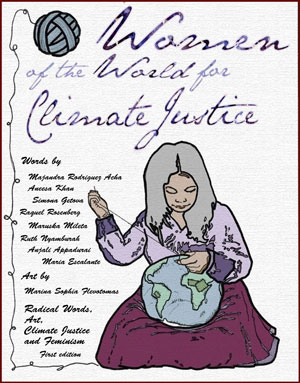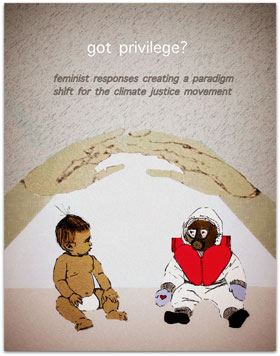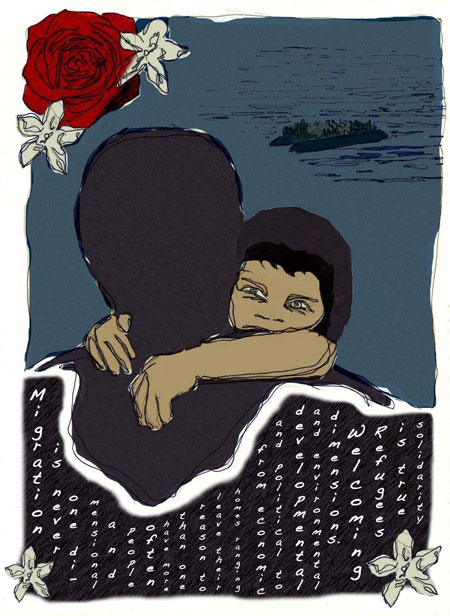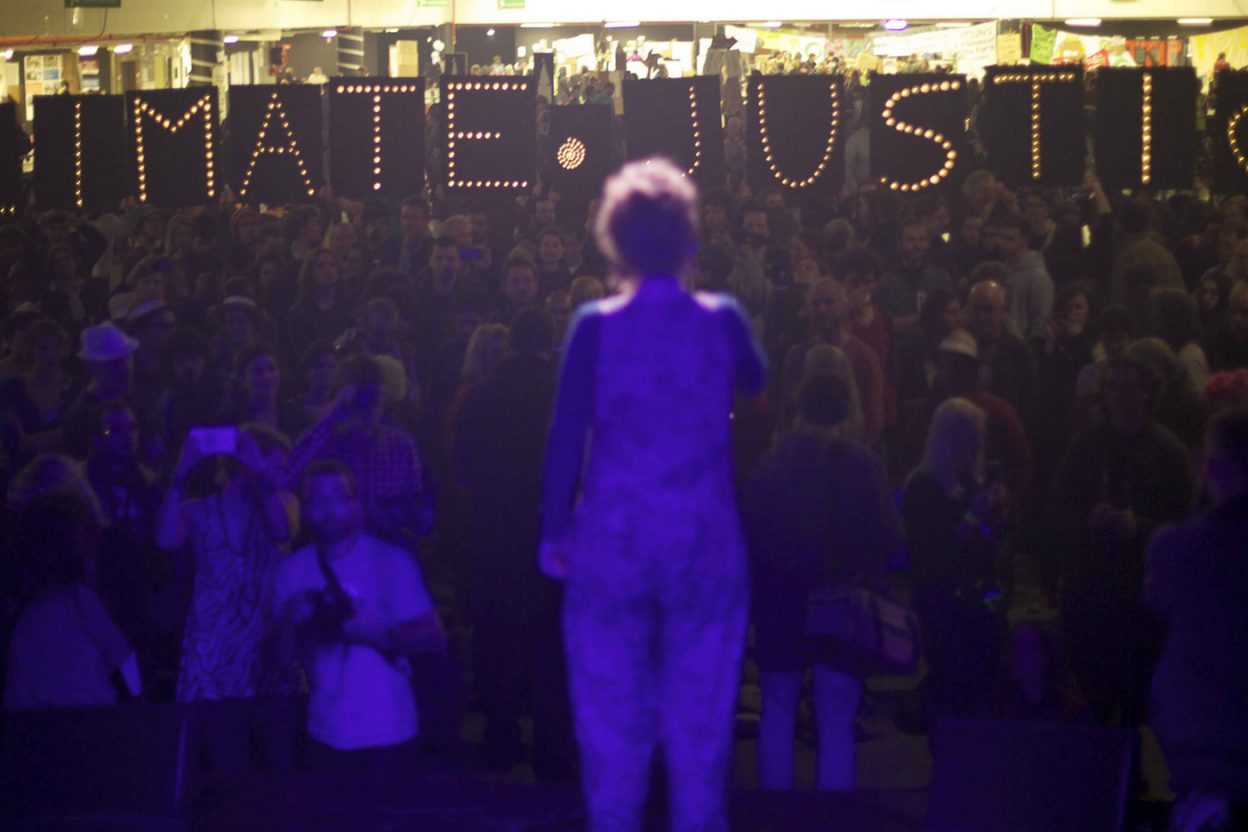Marina is a young woman from Greece who is using art as a way of confronting and challenging injustices while creating the world that we know is possible. Her art can be viewed here.
Some of her previous work includes a beautiful mural in Lima, Peru, that she made together with Luka Tomac of Friends of the Earth Croatia during the UN climate talks in 2014, and which shows how climate change, dirty energy and extractivism are affecting people.
This year in the run up to the UN climate negotiations in Paris, Marina decided to collaborate with radical young women working on climate justice and various intersections, and to focus on People’s movements (feminist) responses creating a paradigm shift in the climate justice movement.
Here are the amazing poster style images created by Marina, and the radical words accompanying them in order to deliver strong, provocative and urgent messages. Young Friends of the Earth actvists Simona and Maruška contributed to this project with their words.
- ‘The walk’ by Simona Getova
I am
A white,
Cisgender,
Macedonian woman.
I am
A middle class,
Work hard – play hard,
Privileged gal.
And I am being presented with opportunities on a daily basis.
I have been given
The careless childhood,
The security,
And the space,
To engage.
I have been given the education,
I will be given the employment,
I am being given the acceptance,
To ‘succeed’.
And although I have had my own demons to fight,
And I have been
Silenced when I needed to speak up,
Expected to remain calm when i was faced with injustices,
And affronted when I did not obey conventional norms,
I am NOT part of the majority of half of the world’s population.
For I have not
Walked miles to collect clean water for me and my family,
Nor have I worked for survival cents from dusk to dawn when I was supposed to be at school.
I have not feared
A tide wiping out my home
And starvation when the crops failed,
Nor have I feared my immediate natural environment catching on fire.
I do not fear
And explosive targeting my shelter,
Nor do I fear losing my loved ones in the abyss of the sea.
I do not fear
Holding my partner’s hand in public,
Nor do I fear starting a family
– The heck, I’m expected to do so.
I am not consistently being revoked basic human rights.
But billions of others are.
Knowing this,
I can
Only do but everything humanly possible with the privilege I have come to this world with,
To be actively creating safe spaces for the ones most vulnerable and most affected,
To be actively enabling platforms and channels for the ones deliberately silenced to share their stories,
To be actively fighting global subordination of women, systemic oppression and patriarchy,
To be actively holding governments, institutions and corporations accountable for their rhetoric and actions,
To be actively demanding national and global actions for a just, intersectional, diverse and transformational participation in our societes,
And to be actively supporting the movements that are doing the same.
I cannot not do anything.
And noone who is slightly aware of this,
Should ever opt for convenient ignorance and passive existance.


2. ‘Welcoming refugees is true solidarity. It is climate justice’ by Maruška Mileta
I was never a refugee myself, but many of my friends and relatives were. This was during the four years long war in Croatia, Serbia and Bosnia and Hercegovina in the 90s, when there were almost 500 thousand displaced persons and refugees in Croatia, and further 150 thousand people were in exile abroad. Almost two million people in Bosnia and Hercegovina had to flee their homes by end of the war. I think this has contributed to why myself and many other people in Croatia have accepted the hundreds of thousands refugees from Syria and many other countries with open arms and hearts because it feels all too familiar and close. But what I think is a more powerful act is to welcome refugees even if you have no personal experience of such kind – to emphathise with another human being even if you have not had their pain, that is real solidarity.
But for many, it is like Europe has forgotten what war and injustices are causing, as if people have short-term memory and cannot see beyond their daily lives. What we need to understand is that what is currently happening is a humanitarian crisis, or better said, crisis of humanity. How are we going to be remembered in history and how will we look at the way we treated refugees and migrants from the Middle East, Africa, and so on, twenty years from now, while some of us are still remembering the painful images of death and destruction in Western Balkans 20 years ago?
The reality is that we are living in an unjust system where rich governments are historically to blame for many current crises and where they do not accept their moral and historical obligations to tackle these crises. Many European countries have exploited Global South nations in Africa for resources like oil in order to get rich, and they are still selling arms in the Middle East and thus fueling wars some of which are rooted in conflicts over natural resources. It is important to have this big picture in mind to be able to understand migration and refugeeism. Migration is never one-dimensional, and people often have more than one reason to leave their homes, ranging from economic and political to development and environmental dimensions.
As a climate justice activist trying to fight against these injustices and understanding how they interlink, I need to speak about climate change and migration. First of, climate change is an intersectional issue, meaning that it is not a single-issue struggle because it generates and fuels inequalities, discriminations and systemic injustices on many levels. Climate change is also violence because its dire consequences – from drought and floods to typhoons – impact people disproportionately and in different ways, from poverty to displacement or even death. It affects individuals’ living and dignity, and their basic human rights.
The communities in the Global South that have already on some level experienced injustice, be it exploitation of resources or wars, they are now also dealing with climate change impacts. 27 million people are displaced by climate – and weather – related disasters each year, and although many of those are internal and temporary migrations (e.g. people rebuild their homes), they undergo huge social and economic consequences. Furthermore, UNHCR predicts that up to 250 million people will be displacedby 2050 as a result of extreme weather conditions, dwindling water reserves and a degradation of agricultural land, but also fight over resources.
Some of the places with ethnic, religious, political and other divides coincide with the regions that will be first and worst affected by climate change. This is also true for poor communities in Europe – in the disastrous floods that hit Western Balkans in May 2014 and displaced almost a million people, most impacted were the people who already suffered during the war in the 90s, either by losing their homes or having had to flee. To emphasize again, connections can be made between violence, conflicts and climate change. Predictions are that failure in tackling climate change will mean not only disastrous weather events, but also national instabilities and armed conflicts.
As a feminist, I need to also talk both about women and men affected by migration and especially the current refugee situation. Women make up 80% of climate refugees around the world. Women are more exposed to climate change impacts. As climate change affects almost every category of oppressed groups, women are on the forefront of climate change all around the world. Women make up most of the world’s poor. Women also produce 70% of world’s food and are often responsible for collecting water – which makes them more vulnerable to extreme weather events affecting crops and water supplies. During catastrophes, they are often the last to leave the affected area. A different dimension is how current conflicts affect men and as a feminist I need to talk about it. Many mainstream media, have judged young men for chosing to flee Syria rather than stay and fight, and thus in their eyes they are not “real men”. In these kind of situations we can see how patriarchy and gender stereotypes are still very alive. I applaud these men for their bravery in chosing the path of peace, and not death and destruction in pointless wars.
But what we need to remember is that women and girls who had to flee their homes are often experiencing further harassment and violence on their way to European or other continents. This is a major issue that isn’t being addressed or is being ignored by most mainstream media and authorities.
In this complex situation, the topic of human rights is crucial, but is it is even more complicated when it comes to climate change. Although the UN has recognised the term or environmental and climate refugees, they are not protected by international law and the asylum system. The question is will their rights be respected and how will they be treated, especially with no international mechanisms in place. Seeing how the European union is currently closing borders to refugees and even deciding who deserves help and who doesn’t by refusing to let in migrants from so-called “safe countries”, an answer to this question can be assumed.
But should we as citizens just stand by and let this happen? My strong answer is no, we cannot and we shouldn’t.
The small amount of time I spent on the Croatian borders with refugees made me even more aware how I cannot call myself a climate justice activists, if I just talk about environmental issues. The world is not simple, but very complex, and as Audre Lorde said – there is no such things as a single-issue struggle. Thus the fight for climate justice is also a fight for environmental justice, social justice, feminism, racial justice, human rights – it’s a fight for communities most impacted by injustices, a fight for humanity.
And in this fight we can never forget who the real criminals are and who is responsible for the many levels of crisis – from conflicts to climate change. And these countries, rich nations in the Global North, are showing their faces more than ever before. Strengthening ‘fortress Europe’ and denying help to those who are fleeing the same kind of violence and attacks that recently France experienced. Segregating those, who according to them, deserve help and those who don’t, because they come from a “safe country” or are economic migrants, and thus violating their basic human rights. Instigating further wars, Islamophobia and xenophobia. These kind of politics that kill – because people are dying oat the gates of Europe – are uncceptable and I will not stand for them. We as a climate justice movement cannot stand for them.
I hope we will not fail this test of humanity, as I still naively think that people can be good. That we can show true solidarity and compassion when faced with challenges. I am determined to continue fighting for a more just world with all I have, and will not allow anyone to destroy this dream. I still have hope for this world and humanity, and I will fight to preserve it. And in this fight I am not alone.


